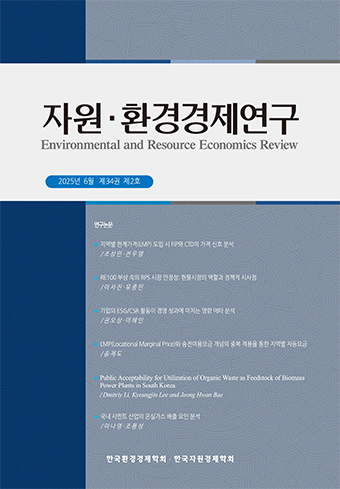Research Paper
Abstract
References
Information
It is crucial to decouple economic growth from greenhouse gas emissions in economies to limit the global warming below 2-degree and achieve the Net Zero. Accordingly, there is an urgent call for assessing the economic impacts of the global mitigation efforts, especially for developing economies. This study applies a recursive dynamic computable general equilibrium model and assesses the economic impacts of the global mitigation efforts and the potential of the International Market Mechanism (IMM). Findings suggest that the economic impacts of the global mitigation efforts could be limited compared to their impacts on CO2 emissions reductions. The changes in the real GDP relative to the BAU level differ by region and scenario. The changes in the real GDI are generally more favorable than those in real GDP across most regions, and the IMM brings some benefits in real GDI in all regions. This study acknowledges the potential of the IMM in achieving the global mitigation targets, with a particular emphasis on the likelihood of more substantial benefits for developed regions. This implies the need for financial supports, technology transfer, and capacity building for developing region to incentivize their participation in the IMM, with a more equitable sharing of the gains from carbon trading.
글로벌 온도 상승을 2도 이하로 제한하고 탄소중립을 달성하기 위해서는 국가의 경제성장 및 온실가스 배출 간 디커플링이 중요하다. 이에 전 세계적으로 감축 노력의 경제적 영향에 대한 분석 중요성이 커지고 있으며, 특히 가파르게 경제가 성장하고, 온실가스 배출량도 증가하고 있는 개발도상국에 대한 관심이 높아지고 있다. 본 연구는 축차동태 글로벌 CGE 모형을 활용하여 글로벌 감축 노력하 국제 탄소시장의 경제적 영향에 대해 살펴본다. 연구 결과에 따르면 글로벌 감축 노력에 따라 경제적인 부담이 발생할 수 있으나, 이산화탄소 배출량 감축 정도에 비해 제한적임을 나타낸다. BAU 대비 실질 GDP, GDI 변화는 지역과 시나리오에 따라 다르게 나타나며, 국제 탄소시장의 도입은 모든 지역의 실질 GDI에 어느정도 긍정적인 효과를 가져온다. 다만, 개발도상국 지역에 비해 선진국 지역에서 국제탄소시장 도입에 따른 경제적 혜택이 더 크게 나타날 수 있다. 보다 공평한 탄소 거래의 이익을 공유할 필요성과 함께 개발도상국의 국제탄소시장 참여를 높이기 위해 재정 지원, 기술 이전, 역량 강화 등이 필요함을 제시하고 있다.
- ADB, Developing Asia economies set to grow 5.2% this year amid global uncertainty, 6 April 2022. https://www.adb.org/news/developing-asia-economies-set-grow-5-2-year-amid-global-uncertainty 10.21642/JGEA.070201AF
- Aguiar, A., M. Chepeliev, E. Corong, and D. van der Mensbrugghe, “The Global Trade Analysis Project (GTAP) Data Base: Version 11,” Journal of Global Economic Analysis, Vol. 7, No. 2, 2022.
- Benson, E., J. Majkut, W. A. Reinsch, and F., Steinberg, “Analyzing the European Union’s Carbon Border Adjustment Mechanism,” CSIS Briefs, 2023. https://www.csis.org/analysis/analyzing-european-unions-carbon-border-adjustment-mechanism
- Black, S., J. Chateau, F. Jaumotte, I. W. Parry, G. Schwerhoff, S. D. Thube, and K. Zhunussova, “Getting on Track to Net Zero: Accelerating a Global Just Transition in This Decade,” Staff Climate Notes, 2022(010), 2022.10.5089/9798400223877.066
- Burfisher, M. E., Introduction to Computable General Equilibrium Models, 2nd ed., Cambridge, Cambridge University Press, 2017.10.1017/9781316450741
- Calel, R., Colmer, J., Dechezleprêtre, A., and M.Glachant, “Do Carbon Offsets Offset Carbon?” American Economic Journal: Applied Economics (Forthcoming), 2024.
- Cameron, A., and M., Baudry, “The case for carbon leakage and border adjustments: where do economists stand?” Environ Econ Policy Stud, Vol. 25, 2023, pp. 435~469.10.1007/s10018-023-00366-0
- Cao, J., H. Dai, S. Li, C. Guo, M. Ho, W. Cai, J. He, H. Huang, J. Li, and Y. Liu, “The General Equilibrium Impacts of Carbon Tax Policy in China: A Multi-model Comparison,” Energy Economics, Vol. 99, 2021, 105284.10.1016/j.eneco.2021.105284
- Chateau, J., F. Jaumotte, and G. Schwerhoff, “Economic and Environmental Benefits from International Cooperation on Climate Policies,” International Monetary Fund, 2022.10.5089/9781616358303.087
- Château, J., R. Dellink, and E. Lanzi, “An Overview of the OECD ENV-linkages Model: Version 3,” OECD Environment Working Papers, OECD Publishing, 2014.
- Climate Watch, Explore nationally determined contributions (NDCs) 2022. https://www.climatewatchdata.org/ndcs-explore
- den Elzen, M. G., I. Dafnomilis, N. Forsell, P. Fragkos, K. Fragkiadakis, N. Höhne, T. Kuramochi, L. Nascimento, M. Roelfsema, and H. van Soest, “Updated Nationally Determined Contributions Collectively Raise Ambition Levels but Need Strengthening Further to Keep Paris Goals Within Reach,” Mitigation and Adaptation Strategies for Global Change, Vol. 27, No. 5, 2022.10.1007/s11027-022-10008-7 35755269 PMC9209833
- Dissanayake, S., R. Mahadevan, and J. Asafu-Adjaye, “Evaluating the Efficiency of Carbon Emissions Policies in a Large Emitting Developing Country,” Energy Policy, Vol. 136, 2020.10.1016/j.enpol.2019.111080
- IEA, Net Zero by 2050, International Energy Agency, 2021.
- IPCC, “Global Warming of 1.5°C” An IPCC Special Report on the impacts of global warming of 1.5°C above pre-industrial levels and related global greenhouse gas emission pathways, in the context of strengthening the global response to the threat of climate change, sustainable development, and efforts to eradicate poverty, Cambridge, Cambridge University Press, 2018.
- Jung, T. Y., Y. G. Kim, and J. Moon, “The Impact of Demographic Changes on CO2 Emission Profiles: Cases of East Asian Countries,” Sustainability, Vol. 13, No. 2, 2021.10.3390/su13020677
- Kim, Y. G., J. Moon, and J. Kim, “Evaluating the Economic Impacts of Korea’s NDC (Nationally Determined Contributions) Implementation via Carbon Pricing: A Global Multiregional Computable General Equilibrium Analysis,” Journal of Climate Change Research, Vol. 14, No. 3, 2023a, pp. 253~275.10.15531/KSCCR.2023.14.3.253
- Kim, Y. G., T. Y. Jung, J. Moon, J. Kim, and G. Estrada, “Costs and Benefits of Low Carbon Transition in Asia,” Asian Development Outlook 2023 Thematic Report Background Papers, Asian Development Bank, 2023b.
- Lo, A. Y., and R. Cong, “Emission reduction targets and outcomes of the Clean Development Mechanism (2005–2020),” PLOS Climate, Vol. 1, No. 8, e0000046, 2022.10.1371/journal.pclm.0000046
- Luderer, G., M. Leimbach, N. Bauer, E. Kriegler, L. Baumstark, C. Bertram, A. Giannousakis, J. Hilaire, D. Klein, A. Levesque, I. Mouratiadou, M. Pehl, R. Pietzcker, F. Piontek, N. Roming, A. Schultes, V. J. Schwanitz, and J. Strefler, Description of the REMIND model (version 1.6), Potsdam Institute for Climate Impact Research, 2015.10.2139/ssrn.2697070
- Nachtigall, D., and J., Ellis, “The economic and environmental benefits from international co-ordination on carbon pricing: Insights from economic modelling studies,” OECD Environment Working Paper, No. 173, 2021.
- NGFS Homepage, Origin and Purpose, https://www.ngfs.net/en
- NGFS, NGFS Climate Scenarios for central banks and supervisors. Network for Greening the Financial System, 2021. https://www.ngfs.net/sites/default/files/media/2021/08/27/ngfs_climate_scenarios_phase2_june2021.pdf
- NGFS, NGFS Scenarios for central banks and supervisors. Network for Greening the Financial System (September 2022), 2022. https://www.ngfs.net/sites/default/files/medias/documents/ngfs_climate_scenarios_for_central_banks_and_supervisors_.pdf.pdf
- Nong, D., T. H. Nguyen, C. Wang, and Q. Van Khuc, “The Environmental and Economic Impact of the Emissions Trading Scheme (ETS) in Vietnam,” Energy Policy, Vol. 140, 2020.10.1016/j.enpol.2020.111362
- Rubin, E. S., I. M. L. Azevedo, P. Jaramillo, and S. Yeh, “A review of learning rates for electricity supply technologies”, Energy Policy, Vol. 86, 2015, pp. 198~218.10.1016/j.enpol.2015.06.011
- Silva Herran, D., and S. Fujimori, “Beyond Japanese NDC: Energy and Macroeconomic Transitions Towards 2050 in Emission Pathways with Multiple Ambition Levels,” Sustainability Science, Vol. 16, No. 2, 2021, pp. 489~501.10.1007/s11625-021-00930-1
- UNFCCC, Adoption of the Paris Agreement. (Draft decision -/CP.21), Paris, France: UNFCCC, 2015.
- UNFCCC, Nationally Determined Contribution Registry, UNFCCC, 2023. https://unfccc.int/NDCREG
- Wang, H. L., Y. Y. Weng, and X. Z. Pan, “Comparison and Analysis of Mitigation Ambitions of Parties’ Updated Nationally Determined Contributions,” Advances in Climate Change Research, Vol. 14, No. 1, 2023, pp. 4~12.10.1016/j.accre.2022.10.001
- Wang, M., and T., Kuusi, “Trade flows, carbon leakage, and the EU Emissions Trading System,” Energy Economics, Vol. 134, 107556, 2024.10.1016/j.eneco.2024.107556
- Publisher :Environmental and Resource Economics Review
- Publisher(Ko) :자원 · 환경경제연구
- Journal Title :자원·환경경제연구
- Journal Title(Ko) :Environmental and Resource Economics Review
- Volume : 33
- No :4
- Pages :439-470
- DOI :https://doi.org/10.15266/KEREA.2024.33.4.439



 자원·환경경제연구
자원·환경경제연구






